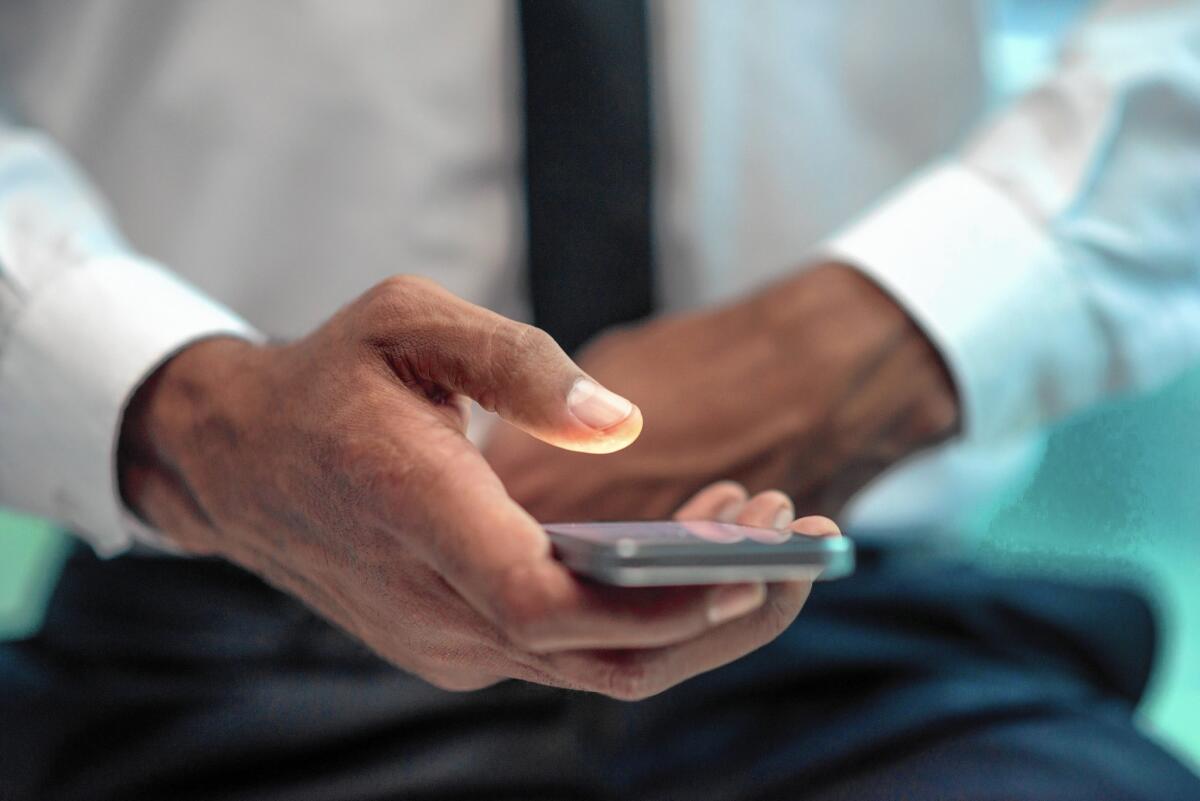Average taxes on wireless bills in California reach a record 18%

The good news: Thanks to increased competition, wireless companies’ rates have dropped nearly 7% since 2008.
The bad news: Average federal, state and local taxes and fees for California customers reached a record 18%, meaning that the government’s slice of your wireless bill is now at least twice as high as the state sales tax imposed on most other goods and services.
Those eye-opening stats come courtesy of the nonpartisan Tax Foundation, which said in a report last week that wireless customers nationwide are paying about $5.8 billion annually in state and local taxes and fees — on top of an additional $5 billion in federal wireless surcharges.
“It’s surprising how high the taxes on smartphones are,” said Joseph Henchman, the Tax Foundation’s vice president for state projects. “They’re easy to miss because it’s 40 cents here and 60 cents there, but they really add up.”
For consumers, one troubling element is that these so-called utility user taxes aren’t intended to support a municipal service, such as sewer cleaning or garbage collection. They’re a tax on a service provided by private companies, which charge their own usage fees.
“At some point, we’re talking about a revenue grab,” Henchman told me.
The city of Los Angeles alone charges a 9% wireless tax, one of the highest in California. That’s before the state and the feds cut themselves in for a piece of the action.
Even though smartphones have become necessities and a crucial component of the digital economy, they’re still taxed in large part as a luxury item. Blame that on the Spanish-American War.
In 1898, the federal government imposed a 3% excise tax on telephone use to help cover a face-off with Spain over the future of Cuba. Phones were relatively scarce at the time, so the tax was intended to be a levy on wealthy Americans.
Uncle Sam didn’t get around to doing away with the phone excise tax until 2006 — more than a century after the United States and Spain decided to call a halt to their five months of skirmishing.
“The idea has remained at the state and local levels that phones should continue being taxed as a luxury,” Henchman said. “That’s why many haven’t changed how the taxes are calculated.”
According to the Tax Foundation, California wireless users pay an average rate of 11.6% in state and local taxes, plus an additional 6.5% for the federal Universal Service Fund, which is intended to extend telecom services to every home.
We’re getting off cheaply compared with Washington state, where wireless users face a rate of about 25% in combined federal, state and local taxes.
Even so, California’s 18% in combined wireless taxes is sharply higher than the state’s 7.5% sales tax and twice L.A.’s 9% sales tax. This raises the question about whether wireless users are being taxed fairly on a proportional basis.
Statewide, 150 cities impose a telephone utility user tax, according to CaliforniaCityFinance.com, a website run by Michael Coleman, who serves as a fiscal policy advisor to the League of California Cities.
He said it’s not unfair for the state’s smartphone users to pay an average 18% tax. The money, he said, helps pay for police and fire departments, road repairs and other municipal activities most of us probably appreciate.
“It’s about making sure there’s funding for government services,” Coleman said.
If so, L.A. is particularly partial to carving a big slice from people’s wireless bills. Palo Alto, home to Facebook, has a 4.75% wireless tax, or about half what L.A. charges. In Mountain View, home to Google, the wireless tax is 3%. In Cupertino, home to Apple, it’s 2.4%.
Ed Cabrera, assistant director of the L.A. Office of Finance, said the bulk of the city’s wireless tax goes to the general fund. I asked why the tax is so high compared with the 4.5% wireless tax levied in unincorporated parts of L.A. County, but Cabrera declined to answer.
Coleman’s take is that it’s not cheap to run a city, especially one as sprawling as Los Angeles. A tax on wireless use is an efficient means of replenishing municipal coffers.
But Henchman at the Tax Foundation also makes a good point: Wireless taxes and fees are easily overlooked by consumers and, thus, are a sneaky way for state and local governments to reach deeper into people’s pockets.
“They’re a nice, nontransparent way to raise revenue, especially at the local level,” he said. “Do most people really know how much they’re paying in wireless taxes each month?”
Now we do. And it definitely seems like a lot.
David Lazarus’ column runs Tuesdays and Fridays. he also can be seen daily on KTLA-TV Channel 5 and followed on Twitter @Davidlaz. Send your tips or feedback to [email protected].
More to Read
Inside the business of entertainment
The Wide Shot brings you news, analysis and insights on everything from streaming wars to production — and what it all means for the future.
You may occasionally receive promotional content from the Los Angeles Times.











